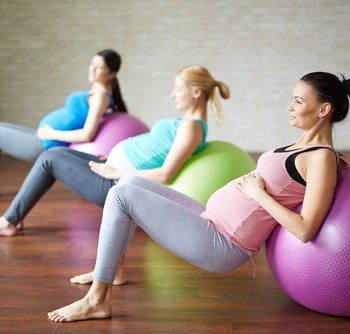Moderate exercise in pregnancy is good
- Helps circulation
- Promotes relaxation
- Improves energy levels
- Combats constipation, cramps, backache
- There are no known adverse effects of meeting the recommended guidelines of at least 150 minutes of moderate physical activity, or 75mins of vigorous activity, per week
Pregnancy is not the time to become fit
- Doing any physical exercise is better than none – start by doing some, and gradually increase as you are able
- Low impact exercise – walking, gentle yoga and stretching, swimming, dancing, prenatal exercise classes, aquarobics, cycling (stationary bike) are all safe and appropriate activities in pregnancy
- Look for pregnancy-specific exercise sessions – gyms, swimming centres, recreation centres,
- Check with your doctor before commencing any program, tell your instructors you are pregnant
- Walking and swimming are free
There are special risks associated with exercise in pregnancy
- Extra ‘relaxin’ hormone – allows your ligaments and joints to be more stretchy – can make you more prone to injury
- Avoid sit-ups and strenuous abdominal exercises – risk of rectus diastasis (separation of the abdominal muscles)
If you were fit and active before you fell pregnant you may need to alter your regime
- Slow the pace, lower the impact, lighten the weights (e.g. hand weights not heavier than 500g)
- Talk to your coach or fitness professional
Some sports need to be avoided because of risk of impact injuries
- Football
- Rollerblading
- Baseball
- Water polo
Others to be avoided
- Horse-riding
- Any kind of skiing
- Backpacking
- Heavy weight lifting
- Heavy manual labour
- May need to reconsider jogging, running and athletics because of stress to joints, breasts, pelvic floor and baby – discuss with your doctor
Some medical conditions that may contraindicate exercise:
- Recurrent miscarriage
- Placenta praevia
- ‘incompetent cervix’
- Pre-eclampsia
- Heart disease
When exercising
- Wear supportive footwear and a properly fitted bra
- Drink plenty of water, have healthy snacks
- Be aware your centre of gravity is changing, which can effect balance and co-ordination – be careful!
- Trust your body – stop exercising if hot, dizzy, faint, crampy, uncomfortable, or overtired. If you don’t feel like exercising on a particular day – don’t!!
- Resting heart rate is higher in pregnancy (its not a sign of lack of fitness!)
- Avoid being overheated for long periods of time, particularly in the first trimester
- Monitor your exercise intensity – fetal heart rate doesn’t change if your heart rate is below 140 beats per minute, where as a maternal heart rate over 180 bpm can affect baby’s heart rate. Another goal is to not work beyond ~75% of your maximum heart rate
- Use the ‘talk test’ to moderate intensity – make sure you can maintain a conversation throughout your exercise. If you can’t, reduce the intensity
- If weight training, chose light weights and medium to high repetition
- Avoid lying flat on your back for more than 2-3 mins in the second trimester, and omit all together from about 20 weeks. The enlarged uterus can compress the inferior vena (big vein) that carries the blood back to your heart and thereby reduce blood flow to your head and the baby. If feeling dizzy or faint on your back roll to the left side and rest
- Don’t forget your pelvic floor exercises!!
Sports Medicine Australia – position statement on exercise in pregnancy – technical but thorough and evidence based resource
Source: “Up the Duff: The real guide to pregnancy” Kaz Cooke 2009. This is a very good (and funny!) resource!



